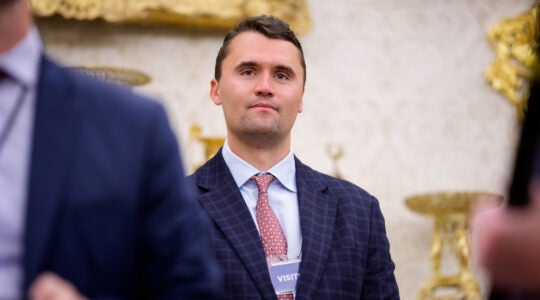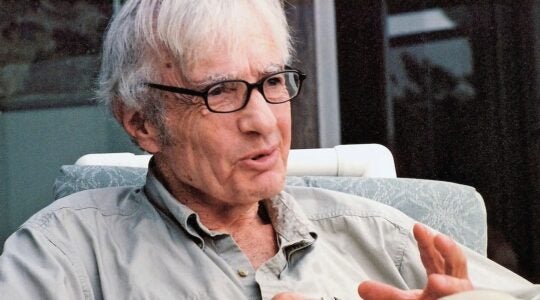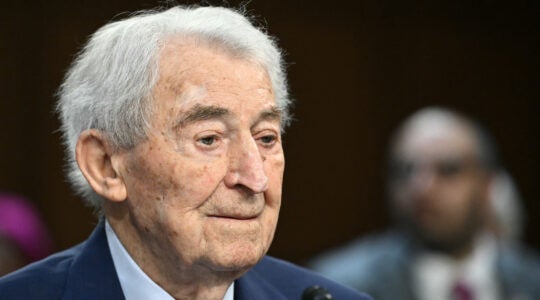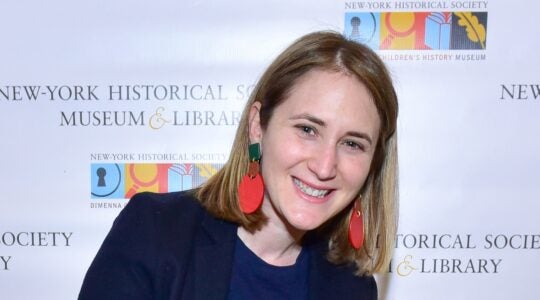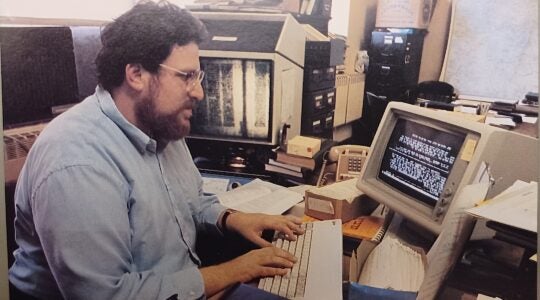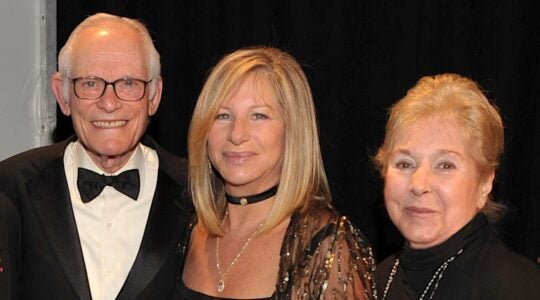Yakov Shapiro, 30, an Israeli emissary at Columbia Hillel
Yakov Shapiro was born in Rishon Lezion, Israel to a family that had emigrated from Belarus. After his military service, he staffed a Jewish Agency camp for children in Ukraine — a decision that confused his mother.
“She couldn’t understand why I would want to return to the former Soviet Union, a place that had been such a source of pain for my family,” he wrote. “I felt that it was the most meaningful way for me to understand my grandmother’s memories and stories, and I felt compelled to go.”
Twice a year for the next six years, he traveled to Ukraine and ran programs for young Jews in underserved areas.
“These experiences in Ukraine not only touch me individually and help me understand my family’s story, but also help me connect with Jewish communities around the world,” he wrote.
Shapiro connected with the American Jewish community from 2021-2024 when he served as a Jewish Agency Campus Israel Fellow at Columbia/Barnard Hillel. There, he met with Jewish students, chatted with Russian-speaking Jews and worked the room at Shabbat dinners. After his term, he stayed in NYC to teach Hebrew at The Abraham Joshua Heschel School. A member of Front Runners NY, a running club for LGBTQ+ athletes, he completed the 2023 NYC Marathon.
“Yakov’s joy and warmth had a tremendous impact on our community,” Hillel staff recalled in an email announcing Shapiro’s death on Sept. 30 at age 30. “He greeted each of us with a wide smile, kind eyes, and an exclamation of ‘chayim sheli — my life!’” No cause of death was given.
Naftali Herstik, 77, renowned cantor and teacher of ‘hazzanut’

Cantor Naftali Herstik was descended from a long line of cantors and rabbis. (Milken Archive of Jewish Music)
“My esteemed teacher.” “My dear teacher.” “My cantorial mentor.” The flood of tributes that followed the news that Cantor Naftali Herstik died Sept. 1 at age 77 noted that he was one of the best known and most influential cantors of his generation.
As the prayer leader at the Great Synagogue in Jerusalem for 30 years, Herstik carried on the nearly operatic tradition of “hazzanut” that linked him to mid-20th century celebrity cantors like Yossele Rosenblatt and Moshe Koussevitzky.
But it was his former students at the Tel Aviv Cantorial Institute, which he founded, who seemed to take the news the hardest: In the classroom and on the bima, one student put it, “He served God and the text without ego.”
Born in Salgótarján, Hungary, he emigrated with his family to Israel at the age of 3 and studied with his own father, a noted cantor. He completed his education at the Royal College of Music in London, serving for years as cantor of the Finchley Synagogue. He also sang in concert with orchestras in London, Jerusalem and Prague.
After retiring from the Great Synagogue in 2012, Herstik frequently led High Holiday prayers at the Chorale Synagogue in Moscow. “My father was facing the challenge of how you lead so many people who are clueless about the Jewish traditions,” Netanel Herstik, the cantor at the Hampton Synagogue on New York’s Long Island, told the New York Times. “But my father knew how to do it well.”
Dr. Ruth Jacobs, 76, an instructor and activist in special education
Dr. Ruth Jacobs, an instructor in special education at Brooklyn and Queens Colleges who devoted her career to people with intellectual developmental disabilities, died on Sept. 24. She was 76.
Jacobs worked for many years at the NYC Department of Education; after retiring she earned her Ed.D. degree from St. John’s University in Queens, New York — one of six advanced degrees she earned in her lifetime. With her optometrist daughter, Dr. Alysha Jacobs, she founded “See A Brighter Future,” a nonprofit providing free eyeglasses to disadvantaged school children.
Jacobs was also active at East Midwood Jewish Center in Brooklyn and its affiliated East Midwood Hebrew Day School, and with the Hatzilu Rescue Organization, which provides food, financial aid and social work support to needy families. Her son Michael remembered his mother as a “professor, educator, volunteer, mentor, congregant, friend and a general force of nature.”
Joel Fleishman, 90, a powerhouse in public policy and philanthropy

Joel Fleishman was a groundbreaking scholar in the field of philanthropy studies. (Duke University)
Joel Fleishman, a scholar of philanthropy and public policy whose invaluable advice extended to a range of prominent Jewish institutions, died on Sept. 30. He was 90.
The founding director of the public policy program at Duke University, the North Carolina native served as a professor of law and public policy at Duke for more than 53 years. As a mentor and networker, Fleishman, an observant Jew, founded a board to shore up Artscroll and Mesorah, publishers of Jewish religious texts, and offered advice that strengthened the Avi Chai Foundation, which promoted Jewish education and engagement before it sunsetted by design in 2019.
In 2021, the Chabad house at Duke was renamed Fleishman House in honor of his commitment to making Jewish students feel at home on campus. Fleishman was also a founding trustee of the American Hebrew Academy in Greensboro, North Carolina, and served as trustee of Brandeis University, the Jewish Theological Seminary of America and the American Friends of the Shalom Hartman Institute in Jerusalem.
“It wasn’t just that Joel knew everybody,” recalled former New York Times columnist Frank Bruni, a colleague at Duke. “He also somehow kept in touch with everybody, tending his existing friendships with a peerless emotional generosity and, on top of that, magically summoning the energy to nurture new ones.”
Eugene Gold, 100, Soviet Jewry activist and prosecutor who put ‘Son of Sam’ away

Brooklyn District Attorney Eugene Gold announces the breakup of a Mafia auto theft ring in 1970. (Bettmann Archive/Getty Images)
Eugene Gold was known for putting one Jew behind bars, and helping to free perhaps millions of others.
Elected Brooklyn’s district attorney in 1968, Gold was also chairman of the Greater New York chapter of the National Conference on Soviet Jewry in the 1970s, and later was national chair of the NCSJ. As a D.A., his highest profile case was the prosecution of David Berkowitz, the so-called Son of Sam serial killer whose rampage terrified New Yorkers in the summer of 1977. (Berkowitz, who received 25 years to life for each of six killings, remains in prison in upstate New York.)
Gold declined to seek reelection in 1981 to devote more time to Jewish causes, and with his wife, Rosaine, moved to Israel for a time. Speaking at a B’nai B’rith conference in 1975, Gold said it was up to American Jews to fight for their coreligionists in the Soviet Union. “We must demonstrate our full mobilization of resources,” he said, “in support of this historic and momentous effort.”
Gold died on Aug. 5 at his home in Woodstock, New York. He was 100.
Alan Potash, 64, a Hillel director and federation professional

Alan Potash was the CEO of the Jewish Federation of the Desert in Palm Springs, California.(Courtesy Jewish Federation of Omaha)
Alan Potash described his almost 30-year career as a Jewish professional as a type of “personal shlichut” — that is, a mission of “working across the spectrum of the Jewish world helping people find their path to understanding why Israel is important and why it is okay to be proud [of] being Jewish too.”
Potash served as director of the Hillel at the University of Illinois from 1998-2003, supporting students who faced anti-Israel protests during the Second Intifada. He was a Midwest regional director with the Anti-Defamation League and the CEO of the Jewish Federation of Omaha, Nebraska from 2015-2021. In 2022, he was named the CEO of the Jewish Federation of the Desert in Palm Springs, California.
He died unexpectedly while recovering from heart surgery on Sept. 22 at the age of 64 at his home in California.
JTA has documented Jewish history in real-time for over a century. Keep our journalism strong by joining us in supporting independent, award-winning reporting.

